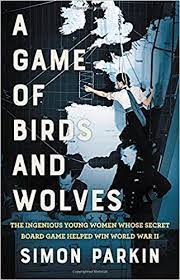The Ingenious Young Women Whose Secret Board Game Helped Win World War II
Goodreads meta-data is 320 pages rated 3.83 by 1211 litizens.
Genre: History
Verdict: Young Adult
After reading The Good Shepard I was primed for more nautical escapades and the write-up and praise for this title enticed me into downloading the (lengthy) sample. I read it and was glad when it ended. That is an hour lost.
It is presented in the manner of a thriller, chopping and changing from time and place without apparent rhyme of reason to keep the reader guessing, or in my case, grousing. Not only that…. Each vignette is padded with back and side stories which have nothing to do with the title.
The offering is based on a synthesis of secondary sources and it shows. The descriptions, of which there are far too many anyway in those back and side stories, are thin. In first sixty pages only one woman appears and a charitable reader will suppose she must be one of the ingenues who became ingenious. But it is only guesswork.
I could go on but I noticed that the writer’s biography refers to him as a ‘video game pundit’ and that suffices to indicate the intellectual level of this book by a writer whose ‘criticism and journalism has been featured in numerous high-profile publications,’ followed by a depressing list of mastheads whose editors ought to have known better.
The breathless History Channel ‘Now It Can Be Told’ presentation is trite. The author warns the reader will be surprised and shocked that board games are used in planning military operations. It seems to have been news to the author that the boards are maps and tokens represent forces constrained by circumstance. Alexander the Great used sand tables to out-think his adversaries; generals and sergeants since have drawn plans in dirt to assess a situation. (Themistocles did so, too, long before Alex but I fear this author will have not heard of this admiral who lured the Persian fleet to its doom by using pebbles on a beach to test his hypothesis.)
The Verdict above as Young Adult indicates that such a readership might find it informative. Anyone who has any interest in the subject already knows all of this and more. Indeed, many tweenage boys who play video games will know all of this already.
By the way, some of the Good Reads reviewers who made it to the end have observed that the ingenious women amount to less than a quarter of the total. Does it follow that three-quarters is padding? ‘Fraid so. Still the overall rating of 3.83 is IMHO proof of the value of Good Reads ratings.

